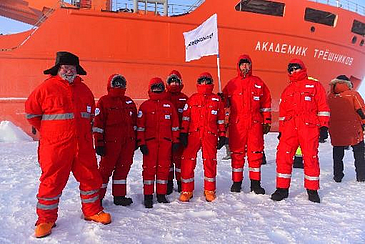The vessel “Akademik Treschnikov” set out for the Russian expedition TRANSARCTIC 2019 in the Barents Sea on March 20, 2019. Alongside Arantxa Triana Gómez and Dmitrii Murashkin from the Institute of Environmental Physics (IUP) at the University of Bremen, researchers from the Alfred-Wegener-Institute, Helmholtz Centre for Polar and Marine Research (AWI) and from GEOMAR Helmholtz Centre for Ocean Research Kiel also participated. The joint work during the approximately two-month long expedition had the aim of investigating the interplay between oceans, ice and atmosphere with regard to the climate changes in the Arctic. The researches continued the long tradition of the Russian-German cooperation in the Arctic.
Polar Bears and Ice Thickness
Polar bear alarm, icy temperatures down to minus 16 degrees, 24 hours of daylight: Arantxa Triana Gómez und Dmitrii Murashkin from the IUP working group “Remote Sensing of Polar Regions”, led by Dr. Gunnar Spreen, experienced many remarkable moments during the long tour of the Arctic. During the expedition, measuring the ice thickness and the snow characteristics were some of the jobs that the Bremen researchers had to complete. Alongside the traditional drilling of holes into the ice, an EM-31-conductivity measuring tool was used in order to determine the ice thickness. This instrument allows for the measuring of longer ice thickness profiles. The exact characteristics of snow were determined using a hyperspectral camera. This data is used for the comparison and improvement of satellite measurements of the ice surface and thickness and also the backscattering particulars, which is what the extent of reflection of sunrays back into space is named. The values yielded directly on the ice will be compared to data that the IUP working group has from measurements taken by European, Japanese and American satellites.
Background: The Arctic is changing and these changes have far-reaching effects. Russia and Germany have been partners in investigating the Arctic for decades. The completed first stage of the Russian TRANSARCTIC 2019 expedition marks another important step in this cooperation.
Frozen for 38 Days
For two months, the Russian research icebreaker “Akademink Treshnikov” was a platform for the researchers, from which they investigated the ocean, ice and atmosphere and their interplay in the Barents Sea. The Arctic and Antarctic Research Institute in Saint Petersburg organized the expedition; German partners were invited to take part. The scientists from the German research institutes successfully investigated the composition of the atmosphere and the ocean water and also the characteristics of the ocean ice together with their Russian colleagues. These analyses were not only carried out from the vessel but also from ice camps around the vessel whilst the frozen vessel drifted with the ice in the north-west of the Francis Joseph’s Land archipelago for 38 days.
Sea Ice Warming Makes New Research Formats Necessary
The Russians have been carrying out analyses from camps on drifting sea ice, which take several months, since 1937. Due to climate warming, the Arctic sea ice is no longer stable enough for such types of North Pole drift stations, which were thus stopped in 2015. Measurements of the central Arctic – not only in the summer, but also in the fall and winter - have therefore become even more important. The experience gained and results yielded during the joint TRANSARCTIC 2019 expedition are not only a further success for the Russian-German cooperation but will radiate into additional international activities.
Further information:
World Meteorological Organization website:
https://public.wmo.int/en/media/news-from-members/roshydromet-russian-federation-marine-expedition-transArctic
Expedition website (in Russian):
http://www.aari.ru/transarctika2019/ta_news.php
Email contact:
Dr. Gunnar Spreen
University of Bremen
Institute of Environmental Physics
Email: gunnar.spreenprotect me ?!uni-bremenprotect me ?!.de
www.seaice.uni-bremen.de

